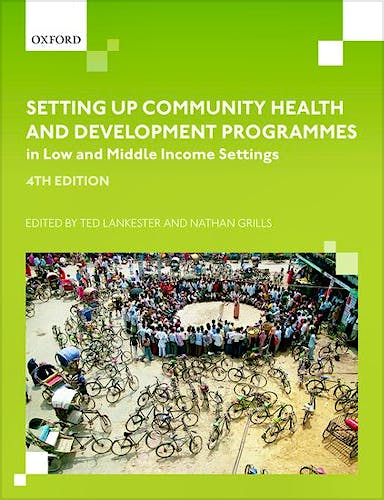

No hay productos en el carrito



Setting up Community Health and Development Programmes in Low and Middle Income Settings
Lankester, T. — Grills, N.
4ª Edición Marzo 2019
Inglés
Tapa blanda
544 pags
1000 gr
19 x 25 x 3 cm
ISBN 9780198806653
Editorial OXFORD UNIVERSITY PRESS
LIBRO IMPRESO
-5%
51,40 €48,83 €IVA incluido
49,42 €46,95 €IVA no incluido
Recíbelo en un plazo de
2 - 3 semanas
Section 1: Community Health Principles
1: Community health: setting the scene
2: Working as partners with the community
3: Community health as part of the health system
4: Health teaching and behaviour change
5: Initial Tasks
6: Learning with the community: participatory appraisal, community survey and diagnosis
7: Drawing up plans
8: The community health worker
Section 2: Community Health Management
9: Monitoring and evaluating the health programme
10: Managing personnel and finance
11: Using medicines correctly
12: How to make a programme sustainable
Section 3: Community Health Topics
13: Setting up and improving a community health clinic
14: Preventing and treating childhood malnutrition
15: Setting up a childhood immunisation programme
16: Dealing with childhood illnesses: diarrhoea, acute respiratory infection and malaria
17: Setting up a maternal and newborn health programme
18: Setting up a family planning and reproductive health programme
19: Setting up a community TB programme
20: A community development approach to HIV care, prevention and control
21: Setting up environmental health improvements
22: Non communicable and chronic diseases
23: Disability and community based rehabilitation
24: Setting up community mental health programmes
25: Helping communities to manage disaster risk
26: The use of information and communications technology (ICT) in health and development
27: Community level responses to violence, abuse and reconciliation
28: Community based home and palliative care
A majority of people living in rural areas and urban slums worldwide have minimal access to healthcare. Without information about what to give a child with stomach flu, how to relieve the pain of a broken bone, and how to work against increased substance abuse in a village, the whole community suffers. Children, adolescents, adults, and older people are all affected by the lack of what many of us view as basic healthcare, such as vaccination, pain killers, and contraceptives. To improve living conditions and life expectancy, the people in urban slums and rural areas need access to a trained health care worker, and a functioning clinic.
Setting up Community Health and Development Programmes in Low and Middle Income Settings illustrates how to start, develop, and maintain a health care programme in poor areas across the world. The focus is on the community, and how people can work together to improve health through sanitation, storage of food, fresh water, and more. Currently, there is a lack of 17 million trained health care workers worldwide. Bridging the gap between medical professionals and people in low income areas, the aim of this book is for a member of the community to receive training and become the health care worker in their village. They will then in turn spread information and set up groups working to improve health. The book also explains in detail how communities can work alongside experts to ensure that practices and processes work effectively to bring the greatest impact.
Copiously illustrated and written in easy-to-read English, this practical guide is designed to be extremely user friendly. Ideal for academics, students, programme managers, and health care practitioners in low and middle income settings worldwide, it is an evidence based source full of examples from the field. Setting up Community Health and Development Programmes in Low and Middle Income Settings shows how a community can both identify and solve its own problems, and in that way own its future.
- This title fully covers the theory and practice of community based health care in the Sustainable Development Goals (SDG) era.
- Written in easy-to-read English with step-by-step instructions, it is accessible to health care workers worldwide.
- Copiously illustrated, this title is a source of both information and inspiration.
- Traditionally, aid and development has been done for communities, causing dependence and side-lining of local leadership. This book takes a completely different approach which places the community in the centre.
- The focus in this book is on collaboration between all relevant parties in both identifying and solving health priorities within a community.
New to this Edition:
- The previous edition was written in the the Millennium Development Goals era. This edition is revised based on the current Sustainable Development Goals.
- This edition is a more diverse and comprehensive source as the editors have added information on mental health, non communicable diseases, disability, addictions, home care and the use of ICT.
- Increased focus on evidence based research.
Edited by Ted Lankester, Co-Founder and Co-Leader; and President and Travel Medicine Physician, Arukah Network; and Thrive Worldwide, and Nathan J. Grills, Associate Professor Global Health, The Nossal Institute for Global Health, University of Melbourne, Melbourne, Australia.
Dr Ted Lankester is Founder and Co-Leader of the global health network Arukah Network (previously known as Community Health Global Network), and President and senior clinician with the international humanitarian support organisation Thrive Worldwide. He has written several books on travel health, as well as chapters on the health of expatriates and humanitarian workers. He has also pioneered new models of health care in the North Indian Himalayas (co-funded by DfiD (ODA) where he was involved in setting up a number of community health programmes in remote areas.
Associate Professor Grills is a Public Health Physician with the Nossal Institute for Global health, University of Melbourne. Dr Grills works on non-communicable diseases, community health and disability largely in the Indian context. He researchers disability measurement and tobacco control policy with the Public Health Foundation of India and the CHGN Uttarakhand Cluster. He has worked in international health in Africa, Fiji, East Timor, PNG, Bangladesh and Nepal.
© 2025 Axón Librería S.L.
2.149.0